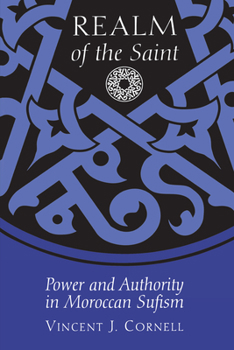Realm of the Saint: Power and Authority in Moroccan Sufism
In premodern Moroccan Sufism, sainthood involved not only a closeness to the Divine presence (walaya) but also the exercise of worldly authority (wilaya). The Moroccan Jazuliyya Sufi order used the doctrine that the saint was a "substitute of the prophets" and personification of a universal "Muhammadan Reality" to justify nearly one hundred years of Sufi involvement in Moroccan political life, which led to the creation of the sharifian...
Format:Paperback
Language:English
ISBN:0292712103
ISBN13:9780292712102
Release Date:October 1998
Publisher:University of Texas Press
Length:444 Pages
Weight:1.35 lbs.
Dimensions:1.1" x 6.0" x 9.1"
Related Subjects
16th Century Africa Islam Modern (16th-21st Centuries) Morocco Religion Religion & Spirituality SufismCustomer Reviews
3 ratings
Very thorough and quite interesting
Published by Thriftbooks.com User , 17 years ago
I believe this is the only work on this topic that I have ever seen. It is very well researched and interesting. The book isn't a light read, however, but more the product of detailed research. I recommend it for those with a deep interest in Morocco and it's various forms of Islamic belief and practice.
Excellent and well written
Published by Thriftbooks.com User , 17 years ago
An excellent work dealing with the development of Sufism and the Sufi orders in Morocco. My only complaint is that it only goes up to the 16th century. This work goes into detail concerning the Jazuli order (but strangely not much detail in the life of al-Jazuli or even his followers active participation in resistance to Portuguese invasion of Morocco) and also in the role of Moroccan tribal families (especially the 'Seyyids') in political life in Morocco. A valuable work for anyone studying Moroccan history, African history or the development of Sufism in the Muslim West.
Moroccan Sufism, saints, "marabouts," etc.!
Published by Thriftbooks.com User , 25 years ago
Anything you would ever want to know about the soial and ideological foundations of Moroccan Sufism and how it fits into the wider Islamic context. From a demographical breakdown of saints to the follies of Abu Yiza, this book has it all and more. Certainly not for the faint of heart, though; Cornell tackles so much that a quick reading just couldn't do the book justice.





